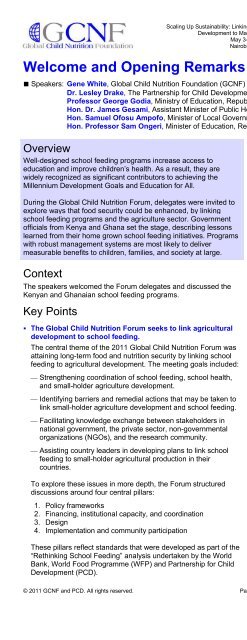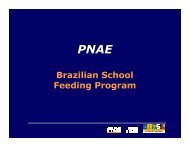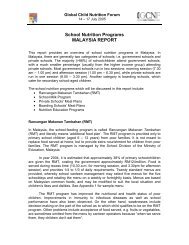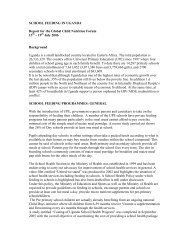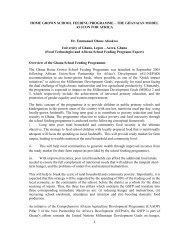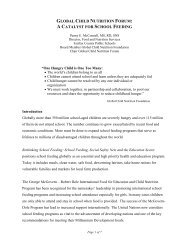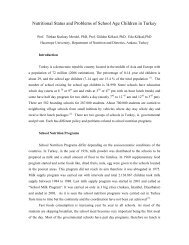EXECUTIVE SUMMARY - Global Child Nutrition Foundation
EXECUTIVE SUMMARY - Global Child Nutrition Foundation
EXECUTIVE SUMMARY - Global Child Nutrition Foundation
Create successful ePaper yourself
Turn your PDF publications into a flip-book with our unique Google optimized e-Paper software.
Scaling Up Sustainability: Linking School Feeding with Agriculture<br />
Development to Maximize Food Security<br />
May 3-7, 2011<br />
Nairobi, Kenya<br />
Welcome and Opening Remarks by the Government of Kenya<br />
■ Speakers: Gene White, <strong>Global</strong> <strong>Child</strong> <strong>Nutrition</strong> <strong>Foundation</strong> (GCNF)<br />
Dr. Lesley Drake, The Partnership for <strong>Child</strong> Development (PCD)<br />
Professor George Godia, Ministry of Education, Republic of Kenya<br />
Hon. Dr. James Gesami, Assistant Minister of Public Health and Sanitation, Republic of Kenya<br />
Hon. Samuel Ofosu Ampofo, Minister of Local Government and Rural Development, Republic of Ghana<br />
Hon. Professor Sam Ongeri, Minister of Education, Republic of Kenya<br />
Overview<br />
Well-designed school feeding programs increase access to<br />
education and improve children’s health. As a result, they are<br />
widely recognized as significant contributors to achieving the<br />
Millennium Development Goals and Education for All.<br />
During the <strong>Global</strong> <strong>Child</strong> <strong>Nutrition</strong> Forum, delegates were invited to<br />
explore ways that food security could be enhanced, by linking<br />
school feeding programs and the agriculture sector. Government<br />
officials from Kenya and Ghana set the stage, describing lessons<br />
learned from their home grown school feeding initiatives. Programs<br />
with robust management systems are most likely to deliver<br />
measurable benefits to children, families, and society at large.<br />
Context<br />
The speakers welcomed the Forum delegates and discussed the<br />
Kenyan and Ghanaian school feeding programs.<br />
Key Points<br />
The <strong>Global</strong> <strong>Child</strong> <strong>Nutrition</strong> Forum seeks to link agricultural<br />
development to school feeding.<br />
The central theme of the 2011 <strong>Global</strong> <strong>Child</strong> <strong>Nutrition</strong> Forum was<br />
attaining long-term food and nutrition security by linking school<br />
feeding to agricultural development. The meeting goals included:<br />
Strengthening coordination of school feeding, school health,<br />
and small-holder agriculture development.<br />
Identifying barriers and remedial actions that may be taken to<br />
link small-holder agriculture development and school feeding.<br />
Facilitating knowledge exchange between stakeholders in<br />
national government, the private sector, non-governmental<br />
organizations (NGOs), and the research community.<br />
Assisting country leaders in developing plans to link school<br />
feeding to small-holder agricultural production in their<br />
countries.<br />
To explore these issues in more depth, the Forum structured<br />
discussions around four central pillars:<br />
1. Policy frameworks<br />
2. Financing, institutional capacity, and coordination<br />
3. Design<br />
4. Implementation and community participation<br />
These pillars reflect standards that were developed as part of the<br />
“Rethinking School Feeding” analysis undertaken by the World<br />
Bank, World Food Programme (WFP) and Partnership for <strong>Child</strong><br />
Development (PCD).<br />
© 2011 GCNF and PCD. All rights reserved. Page 7<br />
Quality education and access to food go hand in hand.<br />
The Kenyan government views education as a social equalizer. It<br />
recognizes, however, that quality education is impossible without<br />
quality food. In the past year, Kenya fed 538,000 children<br />
through home grown school feeding programs. Kenya’s<br />
experiences illustrate the benefits and challenges associated<br />
with these programs.<br />
Feeding programs are a way to attract poor children to school.<br />
In 2003, 5.7 million children participated in Kenya’s free<br />
primary education system. That number has grown to 8.6<br />
million due, in part, to school feeding programs. These<br />
initiatives attract poor and hard-to-reach children, especially<br />
girls, to schools.<br />
School feeding programs provide a safety net to families.<br />
Large numbers of nomadic people live in North Kenya’s arid<br />
and semi-arid regions. In these locations, low-cost mobile<br />
schools have been established with feeding programs.<br />
<strong>Child</strong>ren are also given food rations to take home. In this way,<br />
children provide families with access to food, resulting in a<br />
broader social safety net. WFP has been particularly active in<br />
this area.<br />
Education and food can combat violence. In recent armed<br />
conflicts, African children have been recruited as soldiers.<br />
School-based feeding programs are a way to bring children<br />
back to the classroom and keep them there.<br />
“Peace can only come about when the stomach<br />
is full. We must start there.”<br />
Hon. Professor Sam Ongeri, Minister of Education,<br />
Kenya<br />
Transporting food is expensive. Transporting food to food-<br />
deficient areas is costly. Work is needed to improve supply<br />
chain efficiency. Families must be empowered to grow food.<br />
School feeding programs enhance children’s health.<br />
<strong>Child</strong>hood health is a significant concern in Kenya. A 2008-2009<br />
demographic survey showed that many children are stunted and<br />
hungry. Poor children suffer from iodine, vitamin, and protein<br />
deficiencies.<br />
Kenya’s Ministry of Public Health and Sanitation believes that<br />
school feeding programs can play a major role in improving<br />
health for children. Combining school feeding programs with<br />
complementary programs such as fortification, supplements, and<br />
deworming has the potential to enhance child survival, growth,<br />
and development.<br />
The key to successful and sustainable school feeding programs<br />
is cooperation between the education and health sectors.


